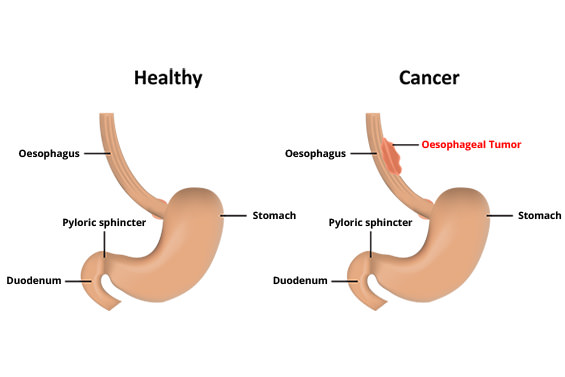Oesophageal & Gastric Cancer
OESOPHAGEAL CANCER
Cancer of the oesophagus (food pipe) is an increasing problem in Australia with more cases being diagnosed. There are two main types of oesophageal cancers that can occur, Squamous Cell Carcinoma (SCC) and Adenocarcinoma with both having similar treatment pathways. The treatment of oesophageal cancers can be difficult and involves a multidisciplinary team (MDT) of doctors (surgeons, medical oncologist, radiation oncologist, radiologists & intensive care specialists) as well as allied health professionals (physiotherapists, dietician & nursing staff).
Causes
There are many factors that contribute to the development of oesophageal cancers.
These can include obesity, reflux, smoking and excessive alcohol.
Symptoms
Patients with oesophageal cancer can describe difficulty swallowing which is usually worse with solid foods then progresses to difficulty swallowing liquids. Weight loss may also develop as a result of poor oral intake.
Tests
An urgent upper endoscopy is required to allow for a diagnosis of oesophageal cancer. At the time of the procedure, biopsies are taken and sent for testing to confirm the diagnosis.
A CT scan as well as a PET scan (nuclear medicine scan) is then performed to look for the extent of the disease. In some cases, further biopsies may be required which can be performed by a radiologist, or at the time of a laparoscopy (keyhole procedure). You will also need to undergo an echocardiogram (ultrasound scan of the heart) and respiratory function tests to make sure you are fit enough to undergo surgery.

Diagnosis
If you are unfortunately diagnosed with oesophageal cancer, the next step will be to review all your investigations and to discuss your case at a Multidisciplinary Team Meeting. At this meeting, the results from biopsies will be reviewed as well as your CT and PET scans. After this meeting, Total Upper GI Surgery will discuss with you the options for the management of your oesophageal cancer.
Treatment
Treatment of oesophageal cancer usually involves patients having chemotherapy +/- radiotherapy initially. Following this, patients will have surgery to remove the oesophagus in 4-6 weeks time.
STOMACH CANCER
Stomach or gastric cancer is an uncommon cancer in Australia and Western societies.
Causes
Some of the causes for stomach cancer include advanced age, helicobacter pylori infection (bacteria that causes stomach ulcers), smoking, obesity, diet and in some instances a gene that occurs in some families.
Symptoms
Patients with gastric cancer may present with symptoms including difficulties swallowing, weight loss, bleeding, fullness, bloating, nausea or abdominal pain.
Tests
An urgent upper endoscopy is required to allow for a diagnosis of gastric cancer. At the time of the procedure, biopsies are taken and sent for testing to confirm the diagnosis.
A CT scan is then performed to look for the extent of the disease. In some cases, further biopsies may be required which can be performed by a radiologist, or at the time of a laparoscopy (keyhole procedure).

Diagnosis
If you are unfortunately diagnosed with gastric cancer, the next step will be to review all your investigations and to discuss your case at a Multidisciplinary Team Meeting. At this meeting, the results from biopsies will be reviewed as well as your CT scans. After this meeting, Total Upper GI Surgery will discuss with you the options for the management of your gastric cancer.
Treatment
Treatment of gastric cancer usually involves patients having chemotherapy initially. Following this, patients will have surgery to remove the stomach in 4-6 weeks time.
GASTROINTESTINAL STROMAL TUMOUR (GIST)
Gastrointestinal stromal tumours (GIST) are tumours that can form anywhere in the gastrointestinal tract. They commonly occur within the stomach and small bowel and can be benign or malignant.
Causes
GISTs arise from the interstitial cells of Cajal which help to control the gut peristalsis. It occurs due to an abnormal gene mutation that leads to the cells growing abnormally.
Symptoms
GISTs can present with an array of symptoms depending on the location where they grow. In the stomach, they can sometimes cause pain, nausea, loss of appetite and a full feeling after eating. They can occasionally cause bleeding or may be asymptomatic if found at the time of a routine upper endoscopy.
Tests
An upper endoscopy is usually required to identify a GIST as well as to document the location of the GIST in the stomach. Biopsies can be taken to help confirm the diagnosis. A CT scan is required to see where the tumour is in relation to other important organs inside the abdomen. It can also identify if the GIST has spread (metastasize).

Diagnosis
If you are unfortunately diagnosed with a GIST, the next step will be to review all your investigations and to discuss your case at a Multidisciplinary Team Meeting. At this meeting, the results from biopsies will be reviewed as well as your CT scans. After this meeting, Total Upper GI Surgery will discuss with you the options for the management of your gastric cancer.
Treatment
Treatment of GIST usually involves surgery to remove the tumour. When the GIST is very large, you may be given a medication to try to shrink the mass before surgery.


